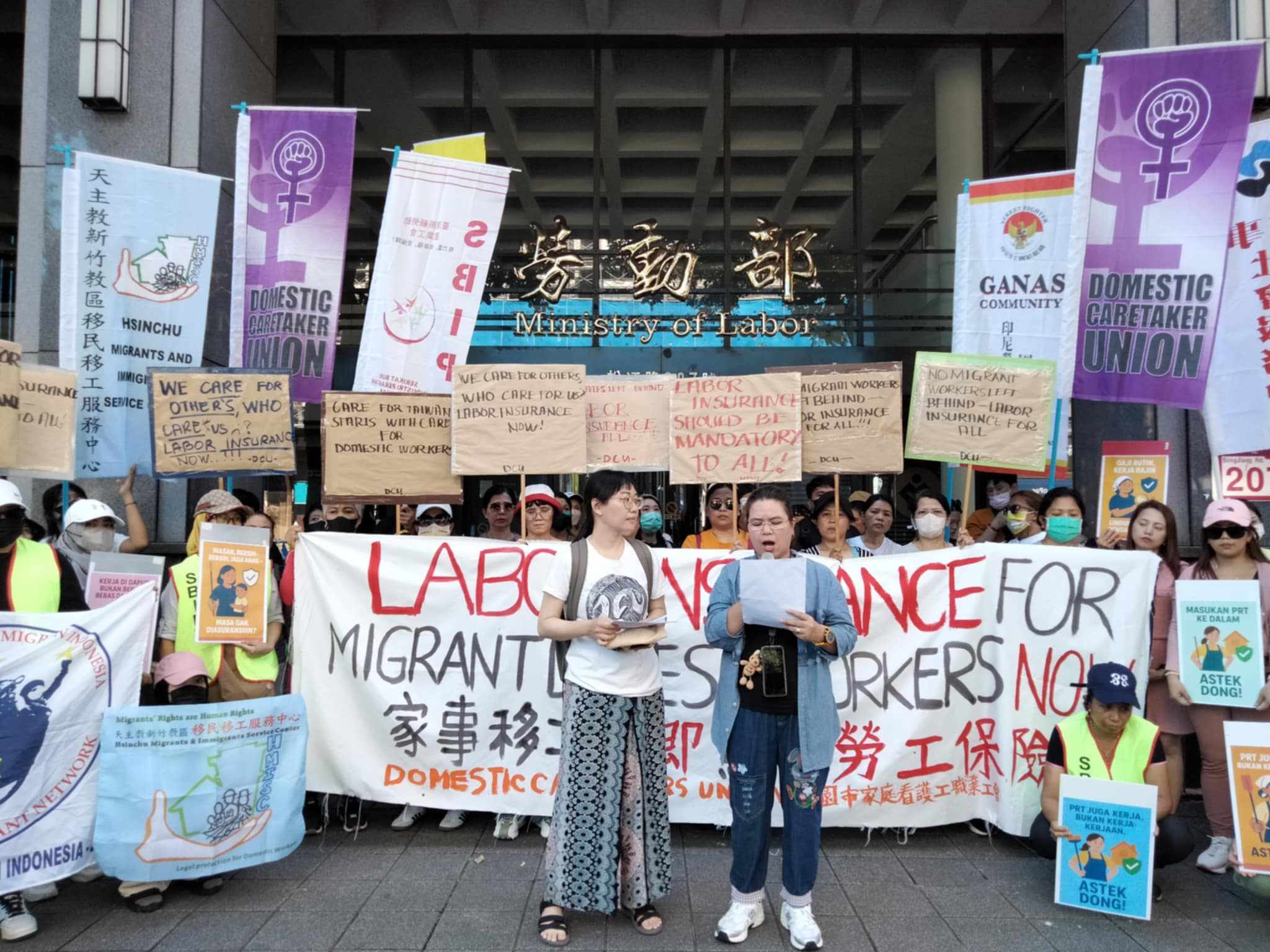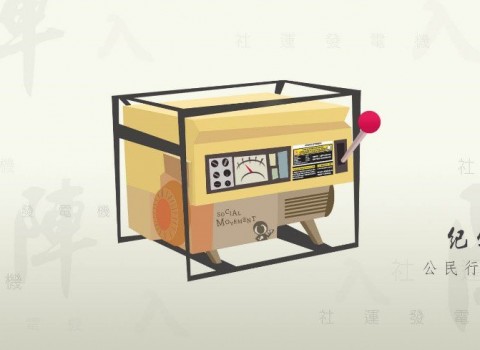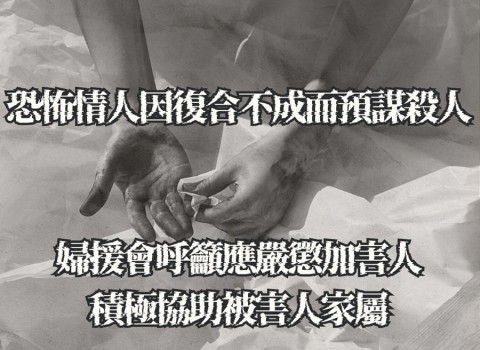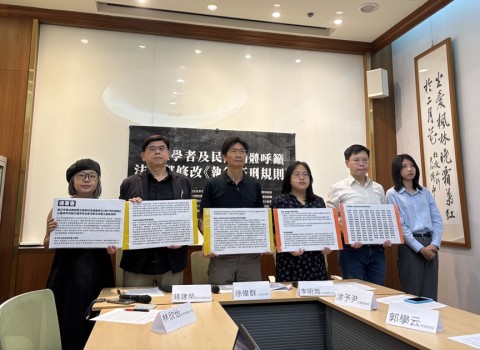文/桃園市家庭看護工職業工會
6月15日是國際家事勞動者日前夕,桃園市家庭看護工職業工會至勞動部前陳情,要求政府將家事移工強制納入勞工保險。數個移工工會及人權團體也到場聲援,要求勞動部正視20萬家事移工被制度性排除在勞工保險以外的處境。
國際家事勞動者日是為紀念國際勞工組織第189公約的通過,樹立了家事勞動者應享有勞動基準,應不亞於其他勞工的勞動保障。桃園市家庭看護工職業工會秘書王誠雲指出,相較其他產業工人,家事移工至今仍被以聘僱人數未達五人為由,沒有被強制納入勞保,王誠雲說:「雖然雇主可以自願加保,但事實上,家事移工就是遭到制度性排除。」
桃園市家庭看護工職業工會(DCU)代表Carol首先說明,家事移工被排除在勞工保險之外,意味著遭逢變故時缺乏保障;當發生意外、疾病或失能時,落入毫無支持的處境;當年邁無法工作時,也沒有退休金可以保障老年生活。Carol也表達,家事移工要求納入勞工保險,並不是特別待遇:「我們只是希望能像台灣其他勞工一樣,被以尊嚴、公平與平等的法律保障對待。」
台灣照顧勞動產業工會(SBIPT)代表Marni舉在台灣罹患癌症的移工為例,說明在沉重的醫療費用之外,最痛苦的是生病與恢復期間完全沒有收入。因為家庭看護工沒有病假薪資保障,也沒有勞工保險傷病給付。Marni沉痛的表示:「當我們無法工作時,我們就沒有任何生活費。」因此,SBIPT支持家事移工也應該被納入勞工保險,獲得平等的對待。
台灣移工聯盟(MENT)聶永莉表示,家事移工迄今為止不適用勞基法。儘管監察院早在2014年的調查報告中,就已要求政府家事移工改善勞動條件低落狀況。而移工盟長期倡議的家事服務法,也被政府以「適法困難」、「沒有共識」及「審慎評估」等話術來卸責。聶永莉認為,勞動部近年來推出的各項移工政策,也只是貪圖移工的「勞動力」,卻不肯把這些勞動者當「人」看。聶永莉強調,移工盟除了來支持所有移工都需強制納保勞保以外,也呼籲盡速立法保障家事移工。
新事社會服務中心李正新以漁工納保為例,說明將雇用未達五人的勞工納入勞保強制投保對象並不是沒有前例,家事移工卻遲遲未納入保險,形成不公平的雙重標準,他認為:「勞動部應該參考外籍漁工的納保經驗,建立配套措施,確保制度順利運作。」此外,李正新也提到境外聘僱的漁工同樣未納入勞工保險,也一樣存在雙標問題。
桃園市群眾服務協會移工庇護中心蕭以采提到,同樣是懷孕生產,家事移工因為沒有勞保強制納保而沒有生育給付,是制度性的歧視。「儘管111實施的職災保險已經將家事移工納保,但如果家事移工在台灣因為意外或是疾病去世,因為不是職業災害,也還是沒有死亡給付。」蕭以采強調,不論哪個類別的勞工,家人都同樣需要花錢辦理喪葬,不應該因為他們的工作類別而被區別對待。
台灣人權促進會施逸翔批評,台灣政府特別是勞動部,長期實質違反各國際人權公約施行法,已嚴重侵害家事移工和遠洋漁工的社會保障權。基於家事移工遭受的歧視性對待,國際人權委員長年來責成勞動部必須將第189公約國內法化,而勞動部所委託的專家學者研究團隊,卻得出台灣所有涉及家事移工的相關制度法規命令「全部皆符合公約」的研究結論與見解。台權會呼籲勞動部,多與今天舉辦記者會的工會及聲援團體,研商如何加速第189號公約施行法的通過,並早日讓家事移工納入勞工保險。
記者會最後,工會會員以雨滴象徵生、老、病、死、傷,表達家事移工與所有的勞工一樣無法避免這些人生事件,因此也期盼與各業勞工一樣,能有勞工保險作為一把保護傘,在面臨傷病時獲得起碼的經濟支持和保障。共同行動團體提出兩點訴求:
一、落實第189號公約的精神,將家事移工納入勞保強制納保的對象。
二、提高政府的保費分攤比例,以減輕長照家庭的經濟負擔。
On the eve of International Domestic Workers Day, June 15, Domestic Caretakers Union Taoyuan (DCU) petitioned the Ministry of Labor, demanding that migrant domestic workers be mandatorily included in the labor insurance. Several migrant worker unions and human rights organizations also gathered to show solidarity, calling on the Ministry of Labor to address the systemic exclusion of over 200,000 migrant domestic workers from labor insurance coverage.
International Domestic Workers Day commemorates the adoption of ILO Convention No. 189, which established that domestic workers should enjoy labor standards and protections equal to those of other workers. Wang Cheng-Yun, secretary of DCU, pointed out that unlike workers in other sectors, more than migrant domestic workers in Taiwan are still not mandatorily covered by labor insurance, simply because their employers usually hire fewer than five employees. “While employers may voluntarily enroll them, in reality, domestic workers are systemically excluded,” Wang emphasized.
Carol, a representative from DCU, explained that being excluded from labor insurance means migrant domestic workers are left unprotected in times of crisis. When they experience accidents, illness, or disability, they face these challenges alone; when they grow old and can no longer work, there is no pension to support their elderly life. Carol emphasized that the demand to be included in labor insurance is not a request for special treatment:
“We only ask to be treated like every other worker in Taiwan—with dignity, fairness, and equal protection under the law.”
Marni, representing SBIPT, shared the story of a migrant worker who was diagnosed with cancer in Taiwan. Beyond the crushing medical costs, the hardest part was having no income during treatment and recovery. Since domestic caretakers are excluded from sick leave pay and labor insurance injury/sickness benefits, Marni stated with deep concern:
“When we can’t work, we have no money to live on.”
This is why SBIPT supports equal inclusion of migrant domestic workers in labor insurance.
Nieh Yung-Li from the Migrants Empowerment Network in Taiwan (MENT) noted that migrant domestic workers are still not protected by Taiwan’s Labor Standards Act. Despite a 2014 report from the Control Yuan calling on the government to improve working conditions for domestic workers, efforts to pass a Household Service Act have been continually delayed with excuses such as “legal difficulties,” “lack of consensus,” and “the need for careful evaluation.” Nieh criticized the Ministry of Labor’s recent migrant worker policies as focused solely on exploiting migrant “labor power” while ignoring their human rights. MENT continues to advocate for both mandatory labor insurance coverage and swift legislation to protect domestic workers.
Jason Lee of Rerum Novarum Center cited the example of foreign fishermen being included in labor insurance as precedent, showing that extending mandatory coverage to workers hired by employers with fewer than five employees is possible. The continued exclusion of domestic workers constitutes a double standard. Lee urged the Ministry of Labor to learn from the foreign fishermen’s insurance model and create similar support measures to ensure smooth implementation. He also pointed out that migrant fishers hired from overseas remain excluded from labor insurance, which is another instance of double standards.
Hsiao Yi-Tsai from the Migrant Worker Shelter of Serve the People Association (SPA) raised the issue of pregnancy and childbirth, noting that domestic workers receive no maternity benefits due to their exclusion from labor insurance—an institutionalized form of discrimination. “Although occupational accident insurance was extended to migrant domestic workers in 2022,” Hsiao said, “if a worker dies from illness or a non-work-related accident, there is still no death benefit.” She stressed that all families, regardless of the worker’s industry, face the same financial burden when dealing with a funeral and should not be treated unequally.
Shih Yi-Hsiang of the Taiwan Association for Human Rights (TAHR) criticized the Taiwanese government—especially the Ministry of Labor—for violating multiple human rights conventions. He noted that international human rights bodies have long urged Taiwan to incorporate C189 into domestic law, especially due to the discriminatory treatment of domestic workers and offshore fishers. Yet, the research commissioned by the Ministry of Labor concluded that all current regulations affecting domestic workers already “fully comply with the convention.” Shih called on the Ministry to genuinely consult with labor unions and advocacy groups, like those organizing the press conference, to expedite the adoption of enabling legislation for C189 and to ensure that domestic workers are included in labor insurance.
At the end of the press conference, union members used raindrops to symbolize the universal vulnerability to life events like birth, aging, illness, injury, and death—emphasizing that domestic workers, like all other workers, need labor insurance as a safety net. When faced with hardship, they should receive at least a basic level of economic support and protection.
The joint demands made by the supporting organizations are:
1. Implement the spirit of ILO Convention No. 189 by making labor insurance mandatory for migrant domestic workers.
2. Increase the government’s share of insurance premium contributions to reduce the financial burden on long-term care families.
發言者(按順序):
桃園家庭看護工工會(DCU) Carol
台灣照顧勞動產業工會 (SBIPT) Marni
台灣移工聯盟(MENT) 聶永莉
新市社會服務中心李正新
群眾服務協會蕭以采
台灣人權促進會施逸翔
共同行動團體:
台灣移工聯盟MENT:
台灣國際勞工協會 (TIWA)
天主教會新竹教區移民及移工服務中心 Hsinchu Diocese Migrants and Immigrants Service Center(HMISC)
天主教明愛會(Caritas)
台灣基督長老教會勞工關懷中心 THE PRESBYTERIAN CHURCH IN TAIWAN LABOUR CONCERN CENTER(Lcc)
海星國際服務中心 STELLA MARIS INTERNATIONAL SERVICE CENTER(Stella)
天主教希望職工中心 HOPE WORKER’ CENTER(HWC)
桃園市家庭看護工職業工會Domestic Caretakers Union Taoyuan (DCU)
台灣照顧勞動產業工會Serikat Buruh Industri Perawatan Taiwan (SBIPT)
聲援團體:
台灣人權促進會Taiwan Association for Human Rights (TAHR)
婦女新知基金會 Awakening foundation
新市社會服務中心Rerum Novarum Center
群眾服務協會Serve the People Association(SPA)
一零九五文史工作室 1095




